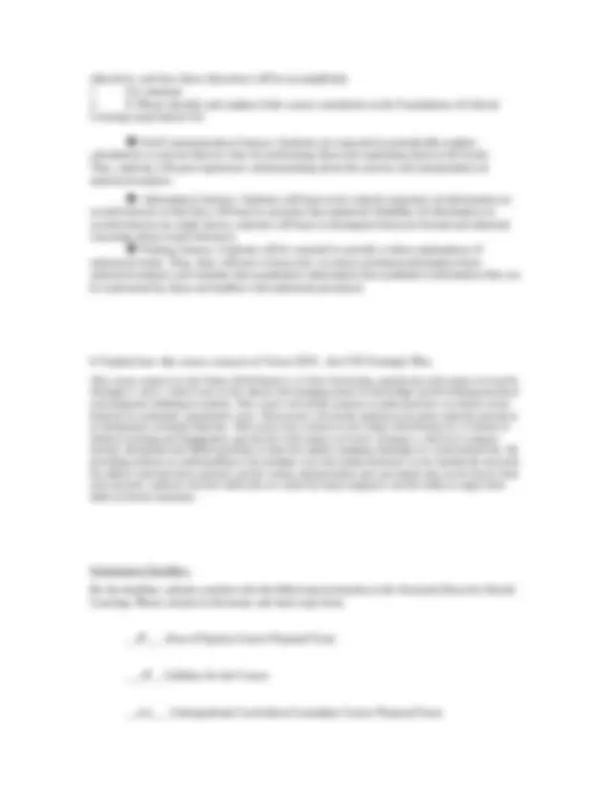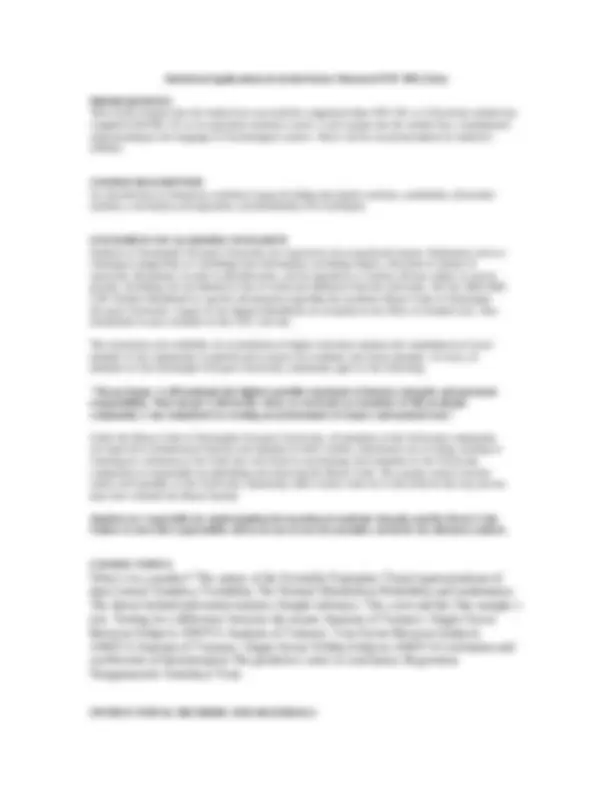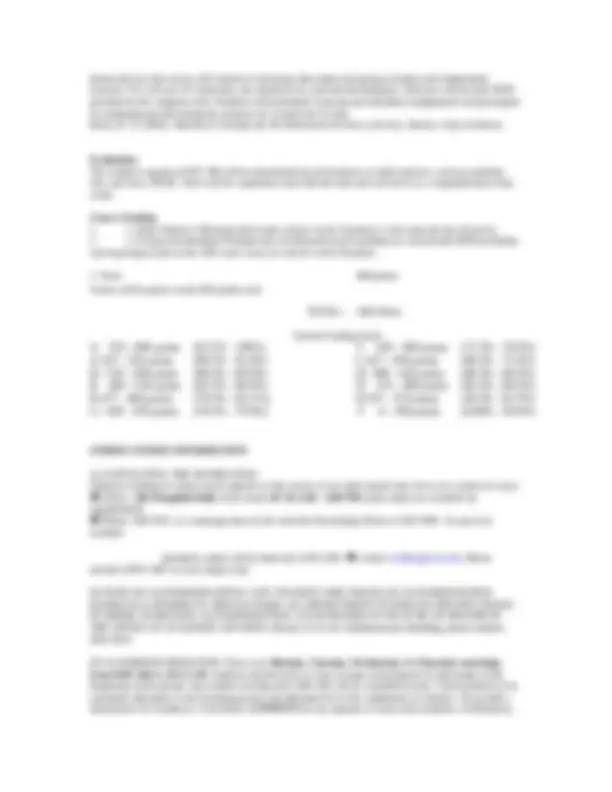





Study with the several resources on Docsity

Earn points by helping other students or get them with a premium plan


Prepare for your exams
Study with the several resources on Docsity

Earn points to download
Earn points by helping other students or get them with a premium plan
Community
Ask the community for help and clear up your study doubts
Discover the best universities in your country according to Docsity users
Free resources
Download our free guides on studying techniques, anxiety management strategies, and thesis advice from Docsity tutors
Material Type: Exam; Class: Statistical Appl-Soc Sci Rsrch; Subject: Psychology; University: Christopher Newport University; Term: Intersession 2004;
Typology: Exams
1 / 7

This page cannot be seen from the preview
Don't miss anything!




Department _Psychology Course Number 300 (^) AREAS OF INQUIRY Course Name: Statistical Applications in SocialScience Research
This form must be submitted to the Faculty Council on Liberal Learning and Academic Life as part of the submission process. Please attach a proposed syllabus for this course and the Undergraduate Curriculum Course Proposal Form. DEADLINE FOR PROPOSALS: 17 December 2004 Please answer the following questions:
Timothy R. Marshall, Chair, Psychology Department, tmarshal@cnu.edu, 594-
PSYC 300: Statistical Applications in Social Science Research: Students who take this course will gain the ability to analyze a research situation so that the proper statistical procedures can be selected and applied to the data by understanding the basic theory that underlies those procedures. Students will also gain the confidence and skill to perform the necessary statistical calculations to complete those procedures, using both manual and computer techniques where appropriate. Finally, students will learn to interpret the results of the calculations in terms of the data or problem at hand.
Statistical Applications in Social Science Research PSY 300 (3 hrs) PREREQUISITES This course requires that the student has successfully completed either PSY 201 or 210,and the student has completed MATH 125 or an equivalent statistics course. I will assume that the student has a fundamental understanding of the language of Psychological science. There will be no preassessment of students= abilities. COURSE DESCRIPTION An introduction to elementary statistical usage including descriptive statistics, probability, inferential statistics, correlation and regression, and distribution-free techniques. STATEMENT ON ACADEMIC INTEGRITY Students at Christopher Newport University are expected to be scrupulously honest. Dishonesty such as cheating or plagiarism, or furnishing false information, including forgery, alteration or misuse of university documents, records or identification, will be regarded as a serious offense subject to severe penalty, including, but not limited to loss of credit and dismissal from the university. See the 2004- CNU Student Handbook for specific information regarding the academic Honor Code at Christopher Newport University. Copies of the Student Handbook are available in the Office of Student Life. This information is also available on the CNU web site. The reputation and credibility of an institution of higher education requires the commitment of every member of the community to uphold and to protect its academic and social integrity. As such, all members of the Christopher Newport University community agree to the following: "On my honor, I will maintain the highest possible standards of honesty, integrity and personal responsibility. That means I will not lie, cheat, or steal and as a member of this academic community, I am committed to creating an environment of respect and mutual trust." Under the Honor Code of Christopher Newport University, all members of the University community are expected to demonstrate honesty and integrity in their conduct. Intentional acts of lying, stealing or cheating are violations of the Code that will result in sanctioning. Each member of the University community is responsible for upholding and enforcing the Honor Code. The system cannot function unless each member of the University community takes actions when he or she believes that any person may have violated the Honor System Students are responsible for understanding the meaning of academic integrity and the Honor Code. Failure to meet this responsibility will in no way lessen any penalties earned by the dishonest student. COURSE TOPICS What=s in a number? The nature of the Scientific Enterprise Visual representations of data Central Tendency Variability The Normal Distribution Probability and randomness The theory behind inferential statistics Simple inference: The z -test and the One-sample t - test. Testing for a difference between the means Analysis of Variance: Single-Factor Between-Subjects ANOVA Analysis of Variance: Two-Factor Between-Subjects ANOVA Analysis of Variance: Single-Factor Within-Subjects ANOVA Correlation and coefficients of determination The predictive value of correlation: Regression Nonparametric Statistical Tests INSTRUCTIONAL METHODS AND MATERIALS
Instruction for this course will consist of classroom discussion and group activities and independent research. We will use A/V materials, the required text, and selected handouts. Software will include SPSS provided in the computer labs. Students will participate in group and individual assignments and participate in explaining and discussing the analyses for various sets of data. Kiess, H. O. (2002). Statistical Concepts for the Behavioral Sciences (3rd ed.). Boston: Allyn & Bacon. Evaluation The student=s grade in PSY 300 will be determined by performance on daily quizzes, work on problem sets, and tests. NOTE: Tests will be cumulative such that the final test will serve as a comprehensive final exam. Course Grading
Students wishing to contact me in regards to this course or any other matter may do so in a variety of ways: � This is a new course that we are now proposing for this Area of Inquiry. Office: 206 Wingfield Hall , office hours M-Th 2:00 - 3:00 PM (other times are available by appointment). � This is a new course that we are now proposing for this Area of Inquiry. Phone: 594-7927, or a message may be left with the Psychology Office at 594-7094.In case of an academic emergency, please call my home line at 591-2401. � This is a new course that we are now proposing for this Area of Inquiry. e-mail:avelkey@cnu.edu. Please include APSY 300" in your subject line. B) NOTE ON ACCOMMODATIONS: ANY STUDENT WHO NEEDS AN ACCOMMODATION BASED ON A DISABILITY SHOULD MAKE AN APPOINTMENT TO DISCUSS SPECIFIC NEEDS. IN ORDER TO RECEIVE ACCOMMODATION, YOUR DISABILITY MUST BE ON RECORD IN THE OFFICE OF ACADEMIC ADVISING (Room 125 in the Administration Building, phone number: 594-7047) D) CLASSROOM BEHAVIOR: Class is on Monday, Tuesday, Wednesday, & Thursday mornings from 8:00 AM to 10:15 AM. Students should arrive at class on time and prepared for discussion at the beginning of the period. Any student arriving after 8:00 AM will be considered tardy. I find tardiness to be extremely disruptive to the learning process and disrespectful to the community of scholars. To provide a disincentive for tardiness, I will deduct 25 POINTS for any episode of unexcused tardiness. Furthermore,